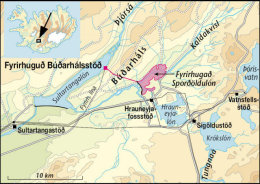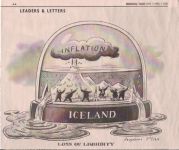Jul 24 2010
Energy for Straumsvík Expansion to Come From Búðarháls-Powerplant
 Rio Tinto Alcan (ISAL) has landed all the energy-related deals necessary for the company to start expanding it’s aluminum smelter in Straumsvík. In the middle of June, Landsvirkjun (National Power Company) and Alcan renewed their current deal on energy purchase between the companies. The renewal included an extension on purchase right up until the year 2036, along with an added purchase of 75MW of power, energy Alcan needed to secure to be able to act on their plans on expanding the smelters productional capacity by 40.000 tons a year. This expansion will not exceed the companies current boundaries, thus manouvering around any results from local referandums against the smelters expansion. As mentioned earlier, the expansion also requires these 75MW of power on top of all the energy Alcan is already receiving at bargain prices. But the deal does have some reservations, most prominently a demand that the uncertainity about the taxation of heavy industry in the country be settled before the 31st of August. This is a clear and blatant example of how the power-sector and aluminum lobbyists toy with the countrys government, that has never dared to resist or stand up to this kind of pressure, or blackmails as it is, of financial muscle, so the same should be expected in this case.
Rio Tinto Alcan (ISAL) has landed all the energy-related deals necessary for the company to start expanding it’s aluminum smelter in Straumsvík. In the middle of June, Landsvirkjun (National Power Company) and Alcan renewed their current deal on energy purchase between the companies. The renewal included an extension on purchase right up until the year 2036, along with an added purchase of 75MW of power, energy Alcan needed to secure to be able to act on their plans on expanding the smelters productional capacity by 40.000 tons a year. This expansion will not exceed the companies current boundaries, thus manouvering around any results from local referandums against the smelters expansion. As mentioned earlier, the expansion also requires these 75MW of power on top of all the energy Alcan is already receiving at bargain prices. But the deal does have some reservations, most prominently a demand that the uncertainity about the taxation of heavy industry in the country be settled before the 31st of August. This is a clear and blatant example of how the power-sector and aluminum lobbyists toy with the countrys government, that has never dared to resist or stand up to this kind of pressure, or blackmails as it is, of financial muscle, so the same should be expected in this case.
A week after the signing of the deal with Alcan, Landsvirkjun invited tenders on the construction of Búðarháls-powerplant and related constructions. The tenders close at the end of August, and construction is expected to be finished by the fall of 2013. Read More
 In September 2009, the Ministry of Environment overruled the Planning Agency’s verdic which stated that no joint Environmental Impact Assessment (EIA) is needed for the S-West Power Grid and the industry that it’s going to be providing for. The case was sent back to the Planning Agency for a more substansial treatment.
In September 2009, the Ministry of Environment overruled the Planning Agency’s verdic which stated that no joint Environmental Impact Assessment (EIA) is needed for the S-West Power Grid and the industry that it’s going to be providing for. The case was sent back to the Planning Agency for a more substansial treatment.